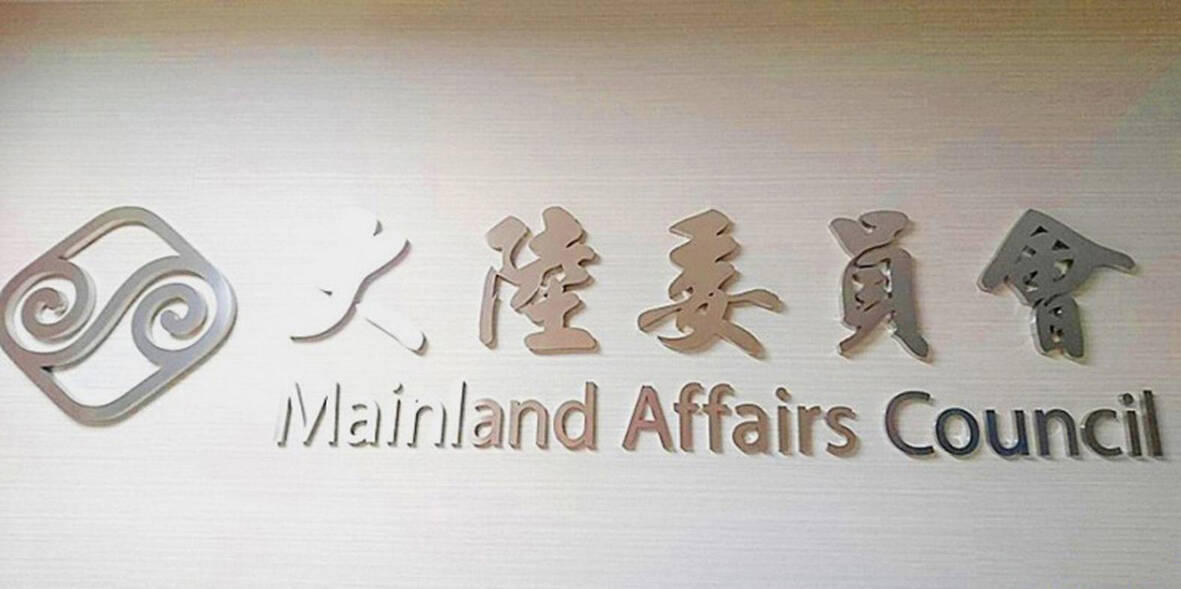Beijing should recognize that Taiwan does not belong to China and handle cross-strait affairs in a “reasonable, practical, equal and mutually respectful manner,” the Mainland Affairs Council (MAC) said yesterday.
The council issued a statement after outgoing Chinese Premier Li Keqiang (李克強) in a speech at the Chinese National People’s Congress said that the Chinese Communist Party (CCP) “resolutely opposes an independent Taiwan and promotes a peaceful unification” with it.
“We once again call for Beijing’s recognition of the fact that Taiwan is not part of China, and vice versa. They should respect the people of Taiwan for upholding the nation’s sovereignty and believing in freedom and democracy, and stop the united front propaganda by military threat and imposing its political framework on Taiwan,” the council said.

Photo: CNA
“They should also handle cross-strait affairs in a reasonable, equal, practical and mutually respectful manner,” the council said. “This would create a condition for healthy interactions between Taiwan and China.”
During the Chinese People’s Political Consultative Conference and National People’s Congress, which are commonly referred to as “the two conferences,” the Chinese State Council is to present a government work report that highlights internal and external challenges, as well as economic stimulus plans following the COVID-19 pandemic, the council said.
The CCP is expected to tighten its control on the country through internal party reforms, it said.
“Beijing should have a more open attitude and invest resources to improve the welfare of the public. It should promote democratic reforms with checks and balances, honor civic groups and keep regional peace. This would help it avoid risks involved in governance and to face the challenges ahead,” the council said.
The government would closely monitor further moves by Beijing and enforce the law to prevent national security risks, it added.
National Cheng Kung University political science professor Hung Chin-fu (洪敬富) yesterday said the CCP did not deviate much from its long-standing policy for Taiwan, judging from the content in the government work report.
“This year marks the beginning of Chinese President Xi Jinping’s (習近平) third term. To fulfill Xi’s ambition of a ‘unified China,’ more Chinese provinces and cities are expected to set goals about increasing exchanges with local governments and the private sector in Taiwan,” Hung said.
“As a result, increased activities from China’s ‘united front’ system could emerge in the second half of this year,” Hung added.
The CCP reiterated its position of “opposing an independent Taiwan and promoting peaceful unification,” as it seeks to lure pro-unification political parties, organizations and individuals to attack the Democratic Progressive Party government and pro-independence groups, Hung said.
The CCP is expected to extend an olive branch to political parties and organizations that agree with the so-called “1992 consensus,” or try to sway public opinion in favor of peaceful unification during next year’s presidential election, he said.
The “1992 consensus” — a term former MAC chairman Su Chi (蘇起) in 2006 admitted making up in 2000 — refers to a tacit understanding between the Chinese Nationalist Party (KMT) and the Chinese government that both sides of the Taiwan Strait acknowledge there is “one China,” with each side having its own interpretation of what “China” means.

DAREDEVIL: Honnold said it had always been a dream of his to climb Taipei 101, while a Netflix producer said the skyscraper was ‘a real icon of this country’ US climber Alex Honnold yesterday took on Taiwan’s tallest building, becoming the first person to scale Taipei 101 without a rope, harness or safety net. Hundreds of spectators gathered at the base of the 101-story skyscraper to watch Honnold, 40, embark on his daredevil feat, which was also broadcast live on Netflix. Dressed in a red T-shirt and yellow custom-made climbing shoes, Honnold swiftly moved up the southeast face of the glass and steel building. At one point, he stepped onto a platform midway up to wave down at fans and onlookers who were taking photos. People watching from inside

A Vietnamese migrant worker yesterday won NT$12 million (US$379,627) on a Lunar New Year scratch card in Kaohsiung as part of Taiwan Lottery Co’s (台灣彩券) “NT$12 Million Grand Fortune” (1200萬大吉利) game. The man was the first top-prize winner of the new game launched on Jan. 6 to mark the Lunar New Year. Three Vietnamese migrant workers visited a Taiwan Lottery shop on Xinyue Street in Kaohsiung’s Gangshan District (崗山), a store representative said. The player bought multiple tickets and, after winning nothing, held the final lottery ticket in one hand and rubbed the store’s statue of the Maitreya Buddha’s belly with the other,

Japan’s strategic alliance with the US would collapse if Tokyo were to turn away from a conflict in Taiwan, Japanese Prime Minister Sanae Takaichi said yesterday, but distanced herself from previous comments that suggested a possible military response in such an event. Takaichi expressed her latest views on a nationally broadcast TV program late on Monday, where an opposition party leader criticized her for igniting tensions with China with the earlier remarks. Ties between Japan and China have sunk to the worst level in years after Takaichi said in November that a hypothetical Chinese attack on Taiwan could bring about a Japanese

‘COMMITTED TO DETERRENCE’: Washington would stand by its allies, but it can only help as much as countries help themselves, Raymond Greene said The US is committed to deterrence in the first island chain, but it should not bear the burden alone, as “freedom is not free,” American Institute in Taiwan Director Raymond Greene said in a speech at the Institute for National Defense and Security Research’s “Strengthening Resilience: Defense as the Engine of Development” seminar in Taipei yesterday. In the speech, titled “Investing Together and a Secure and Prosperous Future,” Greene highlighted the contributions of US President Donald Trump’s administration to Taiwan’s defense efforts, including the establishment of supply chains for drones and autonomous systems, offers of security assistance and the expansion of